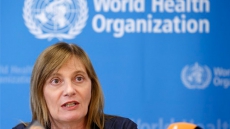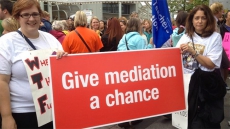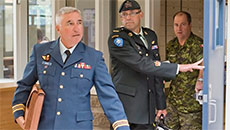TORONTO - It's being called "the Angelina effect."
Angelina Jolie's stunning revelation she had a preventative double mastectomy due to a genetic cancer risk has doubled the number of high risk women considering genetic testing to see if they carry certain genes linked to breast and ovarian cancers, new Canadian research suggests.
Doctors from the cancer centre at Toronto's Sunnybrook Hospital presented their findings in San Francisco on Tuesday at the American Society of Clinical Oncology Breast Cancer Symposium.
"The Angelina effect seemed to increase the awareness and the referral for women who were truly at high risk for hereditary breast cancer," said Dr. Andrea Eisen, one of the study's authors and head of the Familial Cancer Program at Sunnybrook.
"It's not just worried women who came in, or those who have moderate or low risk — it was really high risk women who perhaps were concerned before about pursuing genetic counselling or genetic testing, but who somehow seemed to have felt reassured or encouraged by this story and came forward for assessment."
Jolie made international headlines in May 2013 with an op-ed in the New York Times which detailed her family's history of breast and ovarian cancer, with the Oscar-winning actress noting that she had tested positive for the BRCA1 gene mutation.
She said her doctors estimated that she had a 50 per cent risk of getting ovarian cancer and an 87 per cent risk of breast cancer. After removing her breasts and reconstructing them with implants, she said her likelihood of developing breast cancer dropped to five per cent.
BRCA1 and BRCA2 genes are known as tumour suppressor genes that make proteins to repair DNA and suppress the grown of cancer.
Having a mutation in either of the BRCA genes leads to an elevated risk of breast and ovarian cancers. Certain ethnic groups, among them Ashkenazi Jews, have a higher prevalence of these genetic mutations.

Jolie's story triggered widespread discussion about genetic testing, the BRCA gene mutations and the choices women who carry them had available.
In Canada, BRCA testing is available to women who meet certain risk criteria, including their family history of breast cancer and ethnicity.
Researchers at Sunnybrook's Odette Cancer Centre found that demand for their genetic counselling services appeared to be higher after Jolie's story was made public and decided to examine the issue in detail.
"We knew the numbers had increased but we wanted to see are we really just attracting women who aren't really at risk, who were frightened by her story? Or are we really getting the high risk women who can benefit from being seen," Eisen explained.
Using information from a clinical database, doctors compared the number of referrals for genetic counselling made six months before and after Jolie's revelation. They also compared the number of patients who qualified for genetic testing before and after Jolie's story, and those who carried a BRCA gene mutation.
The doctors found that the number of women referred for genetic counselling increased by 90 per cent — from 487 to 916 — after Jolie's personal story was published.
Among them, there was a 105 per cent increase in the number of patients who qualified for genetic testing — from 213 to 437.
The number of patients who were then identified as carriers of a mutated BRCA gene consequently increased by 110 per cent — from 29 patients before to 61 patients after Jolie's story.
Significantly, the doctors at Sunnybrook found that Jolie's story appeared to have motivated the right kind of patients — those who were likely at a high risk of having the mutated genes — to consider getting tested.
"Sometimes where there's a popular figure in the press, there's a lot of interest, which is great, but it's not always reaching the right women. In this case it actually was the right message," said Eisen.
"It seems to have attracted or convinced or reassured a number of high risk women that it was OK to pursue genetic counselling and testing...These are women who have multiple relatives with breast cancer or ovarian cancer at an early age."

The researchers note that the challenge for the future is to meet the increased demand for genetic counselling, testing and preventative surgery.
They plan to continue their monitoring to see how long the Angelina effect continues, Eisen said.
Researchers also found that women who carried the gene mutation benefited from Jolie's story as it led to others having a better understanding of their situation.
Bonnie Stanfield is one of those women.
The now 65-year-old was just starting to look into genetic counselling when her daughter died suddenly from breast cancer in 2010, leaving her two sons behind.
When Stanfield got tested and found out she was carrying the BRCA1 gene mutation, she eventually decided to have a preventative double mastectomy and had her remaining ovary removed — a year before Jolie's story went public.
"I was thrilled when she did that," Stanfield said of the actress' revelation. "A lot of women don't really know what this gene mutation is about, don't know how to go about finding out."





